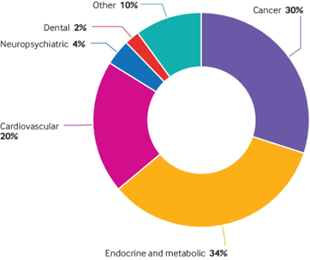Objective To evaluate the quality of evidence, potential biases, and validity of all available studies on dietary sugar consumption and health outcomes.
Design Umbrella review of existing meta-analyses. Data sources PubMed, Embase, Web of Science, Cochrane Database of Systematic Reviews, and hand searching of reference lists.
Inclusion criteria Systematic reviews and meta-analyses of randomised controlled trials, cohort studies, case-control studies, or cross sectional studies that evaluated the effect of dietary sugar consumption on any health outcomes in humans free from acute or chronic diseases.
Results The search identified 73 meta-analyses and 83 health outcomes from 8601 unique articles, including 74 unique outcomes in meta-analyses of observational studies and nine unique outcomes in meta-analyses of randomised controlled trials. Significant harmful associations between dietary sugar consumption and 18 endocrine/metabolic outcomes, 10 cardiovascular outcomes, seven cancer outcomes, and 10 other outcomes (neuropsychiatric, dental, hepatic, osteal, and allergic) were detected. Moderate quality evidence suggested that the highest versus lowest dietary sugar consumption was associated with increased body weight (sugar sweetened beverages) (class IV evidence) and ectopic fatty accumulation (added sugars) (class IV evidence). Low quality evidence indicated that each serving/week increment of sugar sweetened beverage consumption was associated with a 4% higher risk of gout (class III evidence) and each 250 mL/day increment of sugar sweetened beverage consumption was associated with a 17% and 4% higher risk of coronary heart disease (class II evidence) and all cause mortality (class III evidence), respectively. In addition, low quality evidence suggested that every 25 g/day increment of fructose consumption was associated with a 22% higher risk of pancreatic cancer (class III evidence).
Conclusions High dietary sugar consumption is generally more harmful than beneficial for health, especially in cardiometabolic disease. Reducing the consumption of free sugars or added sugars to below 25 g/day (approximately 6 teaspoons/day) and limiting the consumption of sugar sweetened beverages to less than one serving/week (approximately 200-355 mL/week) are recommended to reduce the adverse effect of sugars on health.

Fazit: nichts neues, aber trotzdem spannend – wie schädlich ist Zucker wirklich?
- bisher größte Publikation zu den Gefahren des Zuckerkonsums!
- Gesundheitsschädlicher Effekt von Zucker für insgesamt 45 klinische Endpunkte signifikant (v.a. endokrinologische, kardiovaskuläre, Krebserkrankungen)
- Empfehlung der Autorinnen: Senkung des Zuckerkonsums auf weniger als 6 Teelöffel pro Tag; auf weniger als ca. ein Glas (200-355ml) eines gesüßten Getränkes pro Woche
-> bei den CheckUps kommt immer mal wieder das Thema Ernährung / Zuckerkonsum auf und ich tue mir oft nicht so leicht, da fundierte Empfehlungen zu geben. Das hier hilft vielleicht etwas zur Orientierung – wie beratet ihr eure Patientinnen?
Fazit:
Wir sehen diese Studien eher kritisch. Das Thema Ernährung ist vielen Patienten wichtig, die Umsetzung schwierig. Für uns ist klar, dass Zuckerkonsum – und hier der Genuss von gesüßten Getränken – eine wichtige Komponente in der gesunden Lebensführung sind.